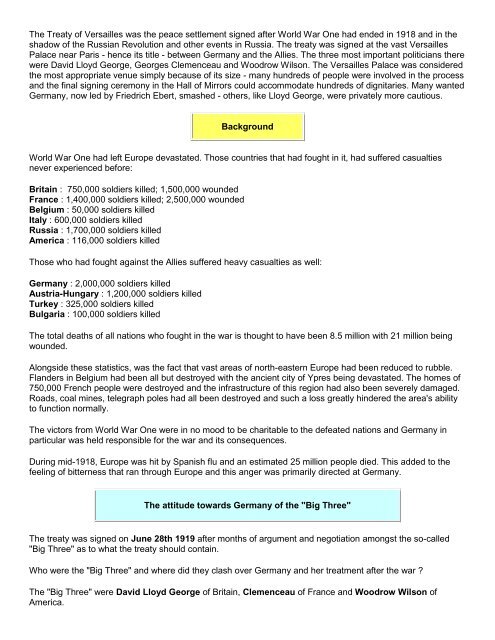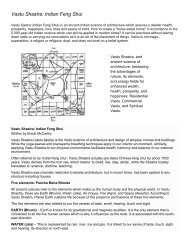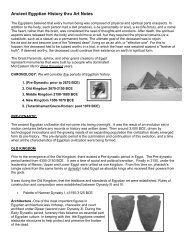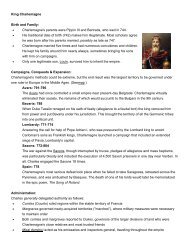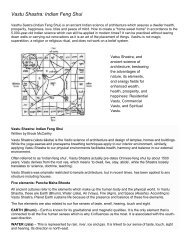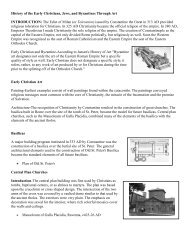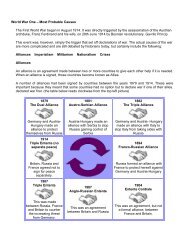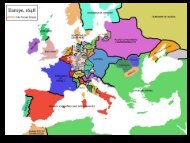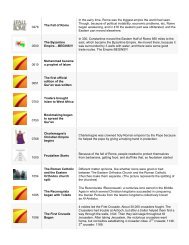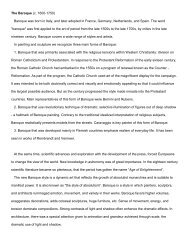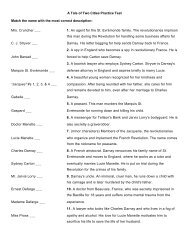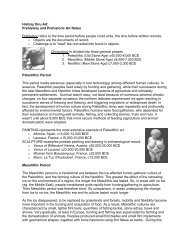end of WW1.pdf - DMHScommunity
end of WW1.pdf - DMHScommunity
end of WW1.pdf - DMHScommunity
Create successful ePaper yourself
Turn your PDF publications into a flip-book with our unique Google optimized e-Paper software.
The Treaty <strong>of</strong> Versailles was the peace settlement signed after World War One had <strong>end</strong>ed in 1918 and in theshadow <strong>of</strong> the Russian Revolution and other events in Russia. The treaty was signed at the vast VersaillesPalace near Paris - hence its title - between Germany and the Allies. The three most important politicians therewere David Lloyd George, Georges Clemenceau and Woodrow Wilson. The Versailles Palace was consideredthe most appropriate venue simply because <strong>of</strong> its size - many hundreds <strong>of</strong> people were involved in the processand the final signing ceremony in the Hall <strong>of</strong> Mirrors could accommodate hundreds <strong>of</strong> dignitaries. Many wantedGermany, now led by Friedrich Ebert, smashed - others, like Lloyd George, were privately more cautious.BackgroundWorld War One had left Europe devastated. Those countries that had fought in it, had suffered casualtiesnever experienced before:Britain : 750,000 soldiers killed; 1,500,000 woundedFrance : 1,400,000 soldiers killed; 2,500,000 woundedBelgium : 50,000 soldiers killedItaly : 600,000 soldiers killedRussia : 1,700,000 soldiers killedAmerica : 116,000 soldiers killedThose who had fought against the Allies suffered heavy casualties as well:Germany : 2,000,000 soldiers killedAustria-Hungary : 1,200,000 soldiers killedTurkey : 325,000 soldiers killedBulgaria : 100,000 soldiers killedThe total deaths <strong>of</strong> all nations who fought in the war is thought to have been 8.5 million with 21 million beingwounded.Alongside these statistics, was the fact that vast areas <strong>of</strong> north-eastern Europe had been reduced to rubble.Flanders in Belgium had been all but destroyed with the ancient city <strong>of</strong> Ypres being devastated. The homes <strong>of</strong>750,000 French people were destroyed and the infrastructure <strong>of</strong> this region had also been severely damaged.Roads, coal mines, telegraph poles had all been destroyed and such a loss greatly hindered the area's abilityto function normally.The victors from World War One were in no mood to be charitable to the defeated nations and Germany inparticular was held responsible for the war and its consequences.During mid-1918, Europe was hit by Spanish flu and an estimated 25 million people died. This added to thefeeling <strong>of</strong> bitterness that ran through Europe and this anger was primarily directed at Germany.The attitude towards Germany <strong>of</strong> the "Big Three"The treaty was signed on June 28th 1919 after months <strong>of</strong> argument and negotiation amongst the so-called"Big Three" as to what the treaty should contain.Who were the "Big Three" and where did they clash over Germany and her treatment after the war ?The "Big Three" were David Lloyd George <strong>of</strong> Britain, Clemenceau <strong>of</strong> France and Woodrow Wilson <strong>of</strong>America.
David Lloyd George <strong>of</strong> Great Britain had two views on how Germany should be treated.His public image was simple. He was a politician and politicians needed the support <strong>of</strong> the public to succeed inelections. If he had come across as being s<strong>of</strong>t on Germany, he would have been speedily voted out <strong>of</strong> <strong>of</strong>fice.The British public was after revenge and Lloyd George's public image reflected this mood. "Hang the Kaiser"and "Make Germany Pay" were two very common calls in the era immediately after the <strong>end</strong> <strong>of</strong> the war andLloyd George, looking for public support, echoed these views.However, in private Lloyd George was also very concerned with the rise <strong>of</strong> communism in Russia and hefeared that it might spread to western Europe. After the war had finished, Lloyd George believed that thespread <strong>of</strong> communism posed a far greater threat to the world than a defeated Germany. Privately, he felt thatGermany should be treated in such a way that left her as a barrier to resist the expected spread <strong>of</strong> communism.He did not want the people <strong>of</strong> Germany to become so disillusioned with their government that they turned tocommunism. Lloyd George did not want Germany treated with lenience but he knew that Germany would bethe only country in central Europe that could stop the spread <strong>of</strong> communism if it burst over the frontiers <strong>of</strong>Russia. Germany had to be punished but not to the extent that it left her destitute. However, it would havebeen political suicide to have gone public with these views.Georges Clemenceau <strong>of</strong> France had one very simple belief - Germany should be brought to its knees so thatshe could never start a war again.This reflected the views <strong>of</strong> the French public but it was also what Clemenceau himself believed in. He hadseen the north-east corner <strong>of</strong> France destroyed and he determined that Germany should never be allowed todo this again. "The Tiger" did not have to adapt his policies to suit the French public - the French leader andthe French public both thought alike.Woodrow Wilson <strong>of</strong> America had been genuinely stunned by the savagery <strong>of</strong> the Great War. He could notunderstand how an advanced civilisation could have reduced itself so that it had created so much devastation.In America, there was a growing desire for the government to adopt a policy <strong>of</strong> isolation and leave Europe to itsown devices. In failing health, Wilson wanted America to concentrate on itself and, despite developing the idea<strong>of</strong> a League <strong>of</strong> Nations, he wanted an American input into Europe to be kept to a minimum. He believed thatGermany should be punished but in a way that would lead to European reconciliation as opposed to revenge.He had already written about what he believed the world should be like in his "Fourteen Points" The mainpoints in this document were:1) no more secret treaties2) countries must seek to reduce their weapons and their armed forces3) national self-determination should allow people <strong>of</strong> the same nationality to govern themselves and onenationality should not have the power to govern another4) all countries should belong to the League <strong>of</strong> Nations.Linked to the "Big Three" was Italy led by Vittorio Orlando. He was frequently left on the sidelines when theimportant negotiations took place despite Italy fighting on the side <strong>of</strong> the Allies. Why was Italy treated in thismanner?At the start <strong>of</strong> the war in 1914, Italy should have fought with Germany and Austria as she had signed the TripleAlliance which dictated that if one <strong>of</strong> the three was attacked, the other two would go to that country's aid. Italydid not join in on Germany's side but waited until 1915 and joined the side <strong>of</strong> Britain and France. Thisassociation with Germany was enough to taint Italy in the eyes <strong>of</strong> the "Big Three". Also Italy had not played anoverwhelming part in the war. Her army had been beaten at the battles <strong>of</strong> Caporetto. Her strategic importanceto central Europe was minimal whilst Britain dominated the Mediterranean with naval bases in Malta andGibraltar. Italy's potential military clout in 1919, should the need arise to put pressure on Germany and Austria,was limited.
Therefore, the three main nations in the lead up to the treaty were far from united on how Germany should betreated. The eventual treaty seemed to satisfy everyone on the sides <strong>of</strong> the Allies. For France, it appeared as ifGermany had been smashed; for Britain, Lloyd George was satisfied that enough <strong>of</strong> Germany's power hadbeen left to act as a buffer to communist expansion from Russia ; Wilson was simply happy that theproceedings had finished so that he could return home.So what exactly did the treaty do to Germany?The terms <strong>of</strong> the Treaty <strong>of</strong> VersaillesThe treaty can be divided into a number <strong>of</strong> sections; territorial, military, financial and general.The following land was taken away from Germany :Alsace-Lorraine (given to France)Eupen and Malmedy (given to Belgium)Northern Schleswig (given to Denmark)Hultschin (given to Czechoslovakia)TerritorialWest Prussia, Posen and Upper Silesia (given to Poland)The Saar, Danzig and Memel were put under the control <strong>of</strong> the League <strong>of</strong> Nations and the people <strong>of</strong> theseregions would be allowed to vote to stay in Germany or not in a future refer<strong>end</strong>um.The League <strong>of</strong> Nations also took control <strong>of</strong> Germany's overseas colonies.Germany had to return to Russia land taken in the Treaty <strong>of</strong> Brest-Litovsk. Some <strong>of</strong> this land was made intonew states : Estonia, Lithuania and Latvia. An enlarged Poland also received some <strong>of</strong> this land.MilitaryGermany’s army was reduced to 100,000 men; the army was not allowed tanksShe was not allowed an airforce She was allowed only 6 capital naval ships and no submarines The west <strong>of</strong>the Rhineland and 50 kms east <strong>of</strong> the River Rhine was made into a demilitarised zone (DMZ). No Germansoldier or weapon was allowed into this zone. The Allies were to keep an army <strong>of</strong> occupation on the west bank<strong>of</strong> the Rhine for 15 years.FinancialThe loss <strong>of</strong> vital industrial territory would be a severe blow to any attempts by Germany to rebuild her economy.Coal from the Saar and Upper Silesia in particular was a vital economic loss. Combined with the financialpenalties linked to reparations, it seemed clear to Germany that the Allies wanted nothing else but to bankrupther.Germany was also forbidden to unite with Austria to form one superstate, in an attempt to keep her economicpotential to a minimum.
Above all else, Germany hated the clause blaming her for the cause <strong>of</strong> the war and the resultant financialpenalties the treaty was bound to impose on Germany. Those who signed it (though effectively they had nochoice) became known as the "November Criminals".Many German citizens felt that they were being punished for the mistakes <strong>of</strong> the German government inAugust 1914 as it was the government that had declared war not the people.Were the terms <strong>of</strong> the Treaty <strong>of</strong> Versailles actually carried out?The League <strong>of</strong> Nations was created. This did happen even if Germany was initially excluded from it.Land had to be handed over the Poland, France, Belgium and Denmark. This did happen - all the landGermany was required to hand over, was handed over. Territory put under League <strong>of</strong> Nations control washanded over to the League.All overseas colonies were to be handed over to the League. This did happen.All land taken from Russia had to be handed back to Russia. This did happen though land in the westernarea became Latvia, Lithuania and Estonia in keeping with the belief in national self-determination.Germany’s army had to be reduced to 100,000 men. On paper this happened. The fact that Germany sidesteppedthe rule did not mean that she literally broke it - though what she did was a deliberate attempt to breakthis term. German soldiers in the 1920’s were signed on for a short contract <strong>of</strong> service and then put in thereserves once their time had finished. Therefore, Germany never had more than 100,000 soldiers serving atany one time though she certainly had substantial reserve soldiers which boosted Hitler when he renouncedthe clauses <strong>of</strong> Versailles.Germany’s navy was reduced to 6 battleships with no submarines. This happened. Germany could notafford battleships in the aftermath <strong>of</strong> the war and most navies were now moving to smaller (by degrees), fasterships that could also carry weapons that carried a punch - such as cruisers. Aircraft carriers were also beingdeveloped with greater commitment. Submariners were trained abroad - Versailles did not cover this, so it didnot break the terms <strong>of</strong> Versailles - only the spirit.No air force was allowed. This happened but as with submariners, potential pilots were trained abroad orusing gliders in Germany to educate them in the theory <strong>of</strong> flying. This did not break Versailles.Western Germany was to be demilitarised. This happened.Germany was forbidden to unite with Austria. This happened.Germany had to accept the "War Guilt Clause" and pay reparations. The former happened in the sensethat Germany signed the Treaty which meant that she accepted this term on paper - if not in fact. Germany didtry and pay reparations when she could do so. She did not refuse to pay in 1922. She simply could not producewhat was needed that year and this led to the French invasion <strong>of</strong> the Ruhr. In the 1920’s it was the Allies whotook the decision to reduce reparations and eased Germany’s plight in so doing. The first instance <strong>of</strong> refusal topay reparations came in 1933 when Hitler announced that Germany would not pay - and the Allies did nothing.Therefore, throughout the 1920’s, in nearly all parts <strong>of</strong> the Treaty, the terms were carried out. It was after 1933,that there was a systematic breaking <strong>of</strong> the terms when the Nazis came to power.The other peace settlementsIt is <strong>of</strong>ten forgotten, that with the energy put into the punishment <strong>of</strong> Germany, other countries fought on herside and, equally, had to be dealt with. These countries were Austria-Hungary, Bulgaria and Turkey.Austria-Hungary had to sign two peace settlements, indicative <strong>of</strong> the fact that this state was shortly to bedivided into two.Austria signed the Treaty <strong>of</strong> Saint Germain.


